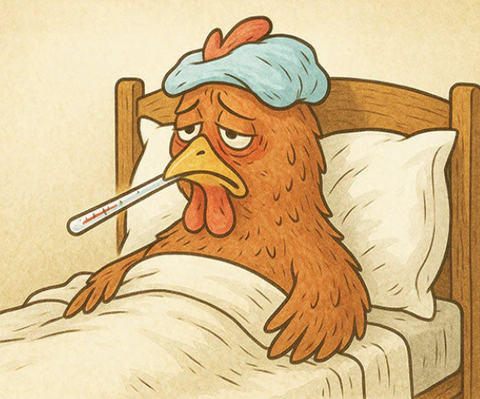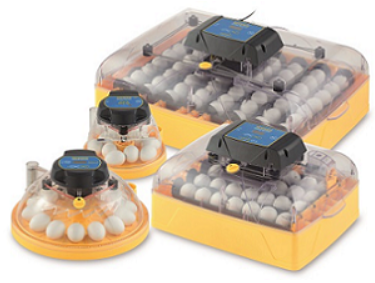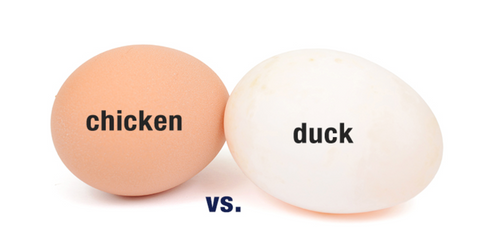🐓 Common Chicken Illnesses & How to Treat Them
What Every Chicken Keeper Should Know to Keep Their Flock Happy and Healthy
Keeping chickens is a joy—but like any animals, our feathered friends can get sick from time to time. Whether you’re a seasoned poultry pro or a brand-new chicken keeper, it’s important to know the most common chicken illnesses, how to spot them early, and what you can do to treat or prevent them.
In this blog, we’ll cover:
✅ The top 7 most common chicken diseases
⚠️ Signs to watch for
🩺 Treatment options
🧼 Prevention tips
Let’s get cluckin’!
🦠 1. Respiratory Infections (e.g., Infectious Bronchitis, Mycoplasma)
🐔 Symptoms:
-
Sneezing or coughing
-
Wheezing or rattly breathing
-
Watery eyes or nasal discharge
-
Drop in egg production
-
Lethargy or loss of appetite
💊 Treatment:
-
Isolate the affected chicken
-
Provide supportive care: electrolytes, warmth, and a stress-free environment
-
Use vet-recommended antibiotics if bacterial (like Mycoplasma)
-
Clean coop thoroughly and increase ventilation
🛑 Prevention:
-
Keep coop dry and well-ventilated
-
Quarantine new birds for at least 2 weeks
-
Avoid overcrowding
-
Regularly clean feeders and waterers
💩 2. Coccidiosis
A common parasitic disease, especially in young chicks, caused by protozoa that damage the gut lining.
🐥 Symptoms:
-
Bloody or mucous-filled droppings
-
Droopiness or lethargy
-
Hunched posture
-
Loss of appetite
-
Weight loss
💊 Treatment:
-
Use anticoccidial medications (e.g., Amprolium / Coccivet) in water
-
Isolate sick birds and keep them warm
-
Sanitize coop and litter thoroughly
🛑 Prevention:
-
Keep coop dry and clean
-
Offer medicated chick starter feed (contains low-dose Amprolium)
-
Rotate or clean bedding regularly
🐛 3. External Parasites (Mites & Lice)
Tiny pests that live on chickens and cause major discomfort.
🐓 Symptoms:
-
Feather loss (especially around vent or neck)
-
Constant scratching or pecking
-
Pale comb and wattles (from blood loss)
-
Visible bugs or eggs near feather shafts or vent
-
Drop in egg laying
💊 Treatment:
-
Apply poultry-safe mite or lice sprays or powders (like Smite)
-
Clean and treat the coop thoroughly
-
Repeat treatment after 7–10 days to kill new hatchlings
🛑 Prevention:
-
Use diatomaceous earth in dust baths
-
Keep bedding dry
-
Regularly inspect your flock for signs of parasites
🦶 4. Bumblefoot
A bacterial infection in the foot pad, often caused by cuts, rough perches, or dirty coop floors.
🐔 Symptoms:
-
Swollen, hot, or red foot pad
-
Limping or reluctance to walk
-
Visible scab or pus-filled lump
💊 Treatment:
-
Clean and soak the foot in Epsom salt solution
-
Apply antiseptic and wrap the foot
-
In severe cases, vet intervention or minor surgery may be needed
🛑 Prevention:
-
Use smooth, sturdy perches
-
Keep bedding clean and dry
-
Check feet regularly for signs of injury
🪱 5. Internal Parasites (Worms)
Worms are common in backyard flocks and can affect egg production, growth, and general health.
🐔 Symptoms:
-
Weight loss despite eating
-
Pale combs
-
Diarrhoea
-
Poor feather condition
-
Worms visible in droppings (in severe cases)
💊 Treatment:
-
Use a broad-spectrum poultry wormer (like Flubenol or Aviverm)
-
Follow correct dosage and repeat after 10–14 days if needed
🛑 Prevention:
-
Rotate free-ranging areas
-
Clean coop and bedding regularly
-
Deworm preventatively every few months if needed
🍳 6. Egg Bound
When a hen is unable to pass an egg—it can be life-threatening if not treated quickly.
🐔 Symptoms:
-
Straining or sitting with tail down
-
Fluffed feathers and distress
-
No egg despite nesting
-
Swollen abdomen
💊 Treatment:
-
Soak hen in warm water bath with Epsom salts for 15–20 mins to relax muscles
-
Gently massage abdomen
-
Apply lubricant (like Vaseline) to vent
-
If the egg doesn’t pass, seek vet care urgently
🛑 Prevention:
-
Ensure proper calcium levels (oyster shell supplement)
-
Keep hens well-hydrated
-
Avoid obesity in laying hens
😴 7. Marek’s Disease
A viral disease that affects the nervous system, often fatal. Most common in young birds.
🐥 Symptoms:
-
Paralysis of legs or wings
-
Twisted neck
-
Weight loss
-
Tumours (internal, not visible)
💊 Treatment:
-
Sadly, there’s no cure.
-
Infected birds often need to be euthanised
🛑 Prevention:
-
Vaccinate chicks at hatch
-
Keep coop and tools clean
-
Quarantine new birds
🧼 General Prevention Tips for a Healthy Flock
Here’s how to give your chickens the best chance of avoiding illness:
✅ Clean coop weekly
✅ Provide fresh water daily
✅ Feed a complete, balanced diet
✅ Supplement with grit, oyster shell, and probiotics
✅ Dust baths help keep parasites at bay
✅ Isolate sick birds immediately
✅ Quarantine new additions
✅ Observe your flock daily—early detection is key!
🧡 Final Thoughts
Chickens are surprisingly hardy, but when illness strikes, quick action can make all the difference. By learning to spot the signs and taking a proactive approach to care, you’ll be giving your flock the best chance at long, healthy lives.
Remember: when in doubt, consult a poultry-savvy vet, and don’t be afraid to ask for help. Your chickens—and their eggs—will thank you!
– The Chook Manor Team 🐔🩺




